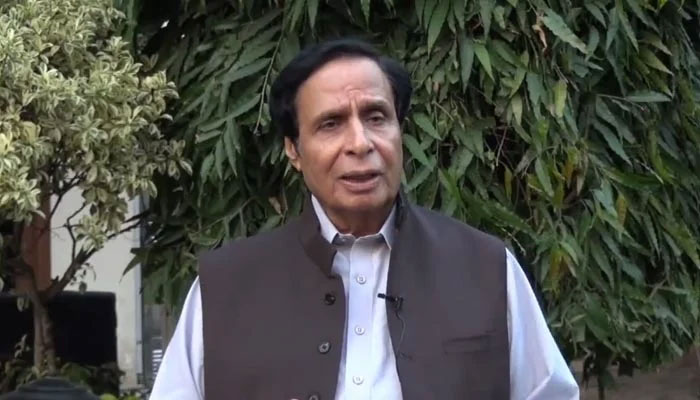Does Elahi require 186 votes to secure vote of confidence?
Punjab CM Parvez Elahi does not require 186 votes but majority of those present in the provincial assembly at the time of voting to secure the vote of confidence, said Wasim Sajjad
ISLAMABAD: Punjab Chief Minister Parvez Elahi does not require 186 votes but majority of those present in the provincial assembly at the time of voting to secure the vote of confidence, said Wasim Sajjad.
Sajjad, a constitutional expert with vast experience of parliamentary politics, said that the Constitution does not require the chief minister to secure a majority vote of the "total membership" of the provincial assembly. He explained that the relevant article talks about the majority of MPAs.
The Article 130(7) is relevant in this case. It reads as: “The Chief Minister shall hold office during the pleasure of the Governor, but the Governor shall not exercise his powers under this clause unless he is satisfied that the Chief Minister does not command the confidence of the majority of the members of the Provincial Assembly, in which case he shall summon the Provincial Assembly and require the Chief Minister to obtain a vote of confidence from the Assembly.”
Wasim Sajjad, when approached, explained that the chief minister when asked by the Governor to seek a vote of confidence, is not required to get a majority vote of total membership of the House but of those present. He explained that for the election of chief minister, the majority of the total membership is required. However, for vote of confidence, the Article 130(7) only required confidence of the majority of members present.
The Article 130(4) deals with the election of the chief minister. In this Article, there is a clear mention of “votes of the majority of the total membership”.
The Article 130(4) reads as: “(4) The Chief Minister shall be elected by the votes of the majority of the total membership of the Provincial Assembly:
“Provided that, if no member secures such majority in the first poll, a second poll shall be held between the members who secures the two highest numbers of votes in the first poll and the member who secures a majority of votes of the members present and voting shall be declared to have been elected as Chief Minister:
“Provided further that, if the number of votes secured by two or more members securing the highest number of votes is equal, further polls shall be held between them until one of them secures a majority of votes of the members present and voting.”
Punjab is presently the focus of politics after Imran Khan’s decision to dissolve the assemblies in Punjab and KP. He had announced to dissolve the assemblies on December 23 but the PDM blocked the move by seeking through Governor a vote of confidence from Parvez Elahi. The PMLN-led opposition had also moved a vote of no-confidence against the Punjab CM.
The Punjab CM was asked by the Governor to seek a vote of confidence on Dec 22 but the PTI ignored it, which led to the de-notification of Parvez Elahi as CM by the Governor.
The matter went to the LHC, which on Friday restored Parvez Elahi as CM only after Elahi’s undertaking that he would not dissolve the provincial assembly till Jan 11, the next hearing of the case.
The PTI-led coalition in Punjab claims that the CM will possibly secure a vote of confidence before January 11. Generally, the number 186 is discussed as the minimum votes required by Elahi to secure the vote of confidence. However, Wasim Sajjad’s interpretation of the relevant constitutional provisions make this number irrelevant.
-
 Alix Earle And Tom Brady’s Relationship Status Revealed After Cosy Super Bowl 2026 Outing
Alix Earle And Tom Brady’s Relationship Status Revealed After Cosy Super Bowl 2026 Outing -
 Why King Charles Has ‘no Choice’ Over Andrew Problem
Why King Charles Has ‘no Choice’ Over Andrew Problem -
 Shamed Andrew Wants ‘grand Coffin’ Despite Tainting Nation
Shamed Andrew Wants ‘grand Coffin’ Despite Tainting Nation -
 Keke Palmer Reveals How Motherhood Prepared Her For 'The Burbs' Role
Keke Palmer Reveals How Motherhood Prepared Her For 'The Burbs' Role -
 King Charles Charms Crowds During Lancashire Tour
King Charles Charms Crowds During Lancashire Tour -
 ‘Disgraced’ Andrew Still Has Power To Shake King Charles’ Reign: Expert
‘Disgraced’ Andrew Still Has Power To Shake King Charles’ Reign: Expert -
 Why Prince William Ground Breaking Saudi Tour Is Important
Why Prince William Ground Breaking Saudi Tour Is Important -
 AOC Blasts Jake Paul Over Bad Bunny Slight: 'He Makes You Look Small'
AOC Blasts Jake Paul Over Bad Bunny Slight: 'He Makes You Look Small' -
 At Least 53 Dead After Migrant Boat Capsizes Off Libya
At Least 53 Dead After Migrant Boat Capsizes Off Libya -
 'God Of War' Announces Casting Major Key Role In Prime Video Show
'God Of War' Announces Casting Major Key Role In Prime Video Show -
 Real Reason Prince William, Kate Broke Silence On Andrew Scandal Revealed
Real Reason Prince William, Kate Broke Silence On Andrew Scandal Revealed -
 Drew Barrymore Responds To 'Charlie's Angels' Costar's Comments About Her
Drew Barrymore Responds To 'Charlie's Angels' Costar's Comments About Her -
 Shakira Slips Hard On Stage During Life Show
Shakira Slips Hard On Stage During Life Show -
 King Charles Speaks Out Over Andrew's Scandal: 'Stand Ready To Help Police'
King Charles Speaks Out Over Andrew's Scandal: 'Stand Ready To Help Police' -
 Dax Shepard Recalls Horrifying Accident That Almost Killed Him
Dax Shepard Recalls Horrifying Accident That Almost Killed Him -
 Logan Paul's Bodyguard Hits Fan On Super Bowl Day
Logan Paul's Bodyguard Hits Fan On Super Bowl Day




